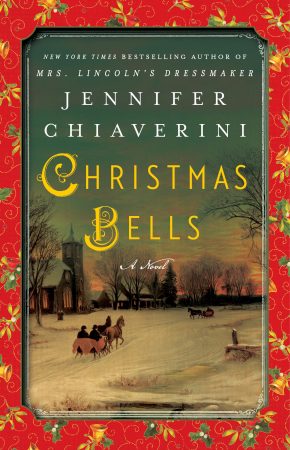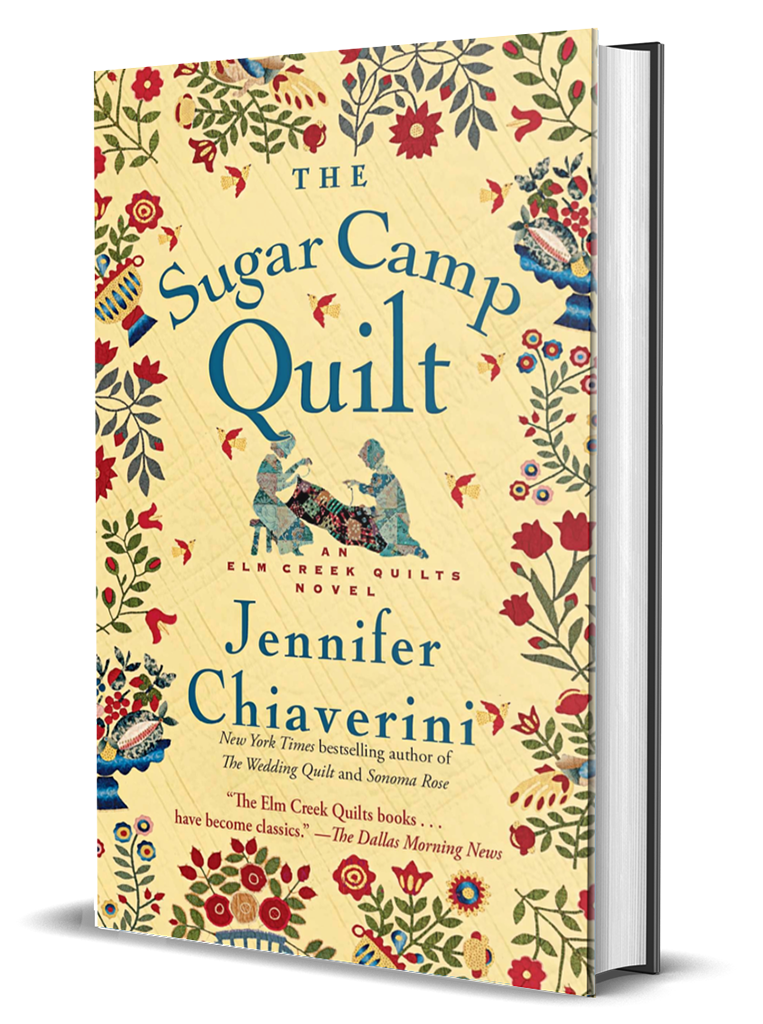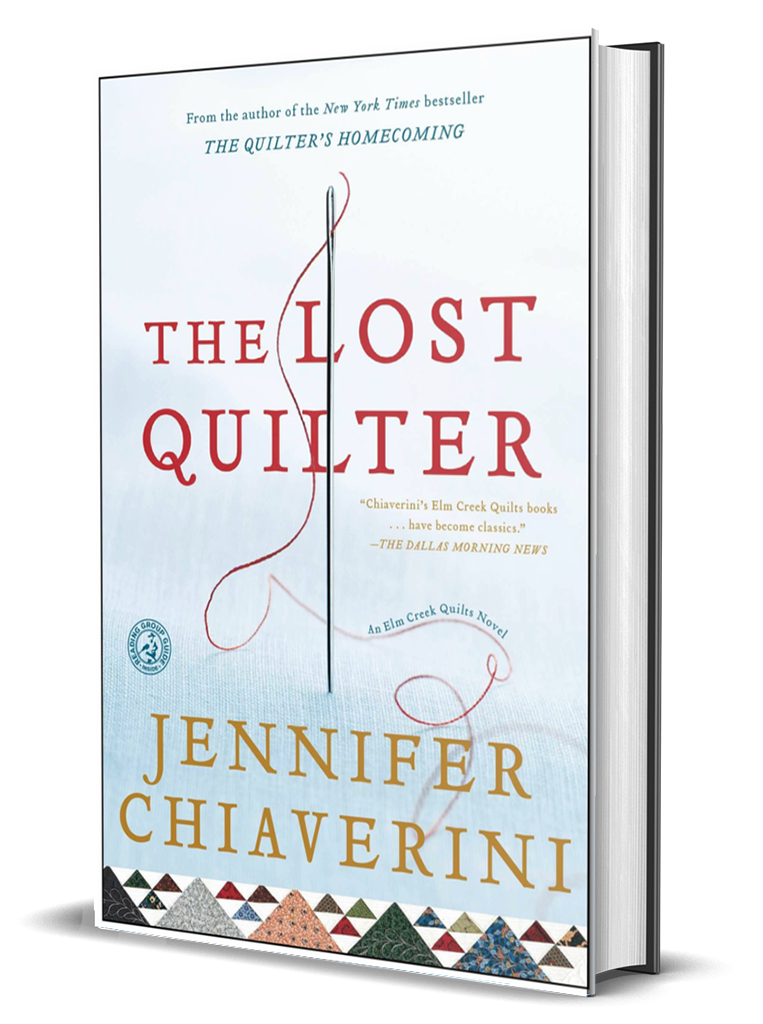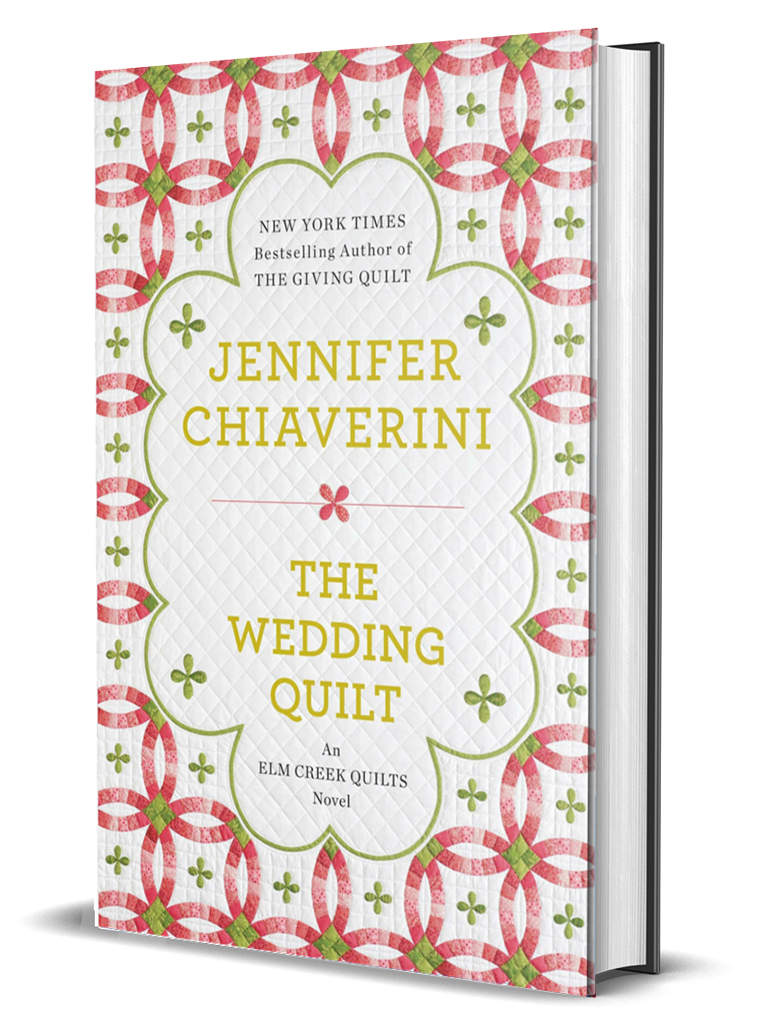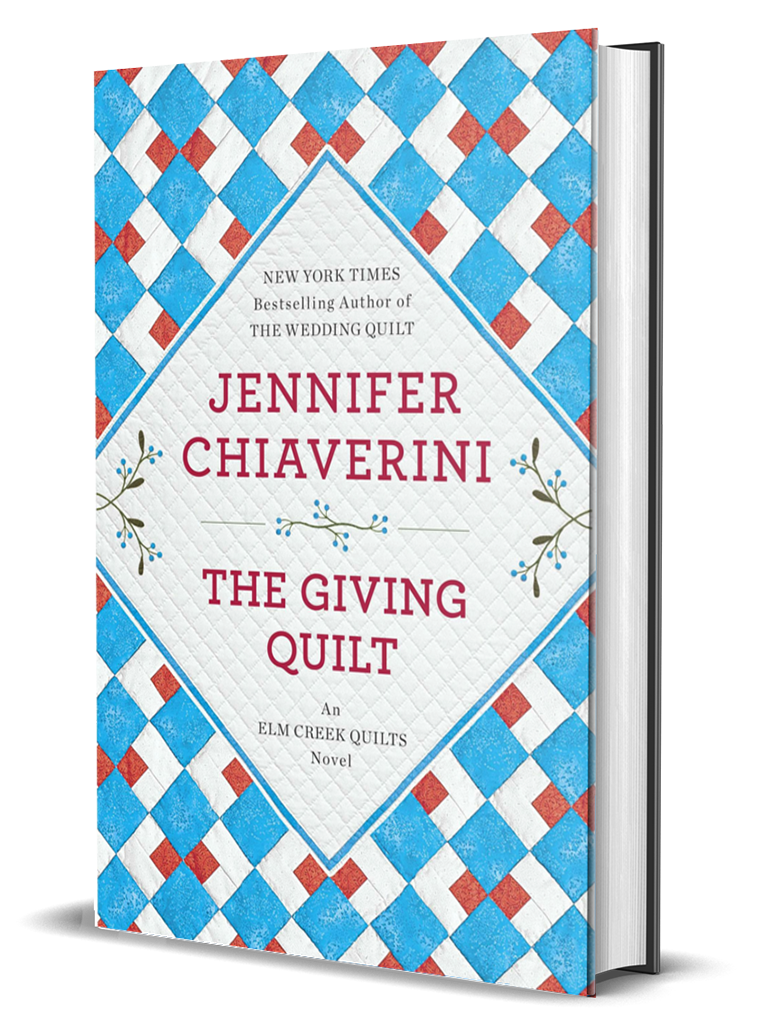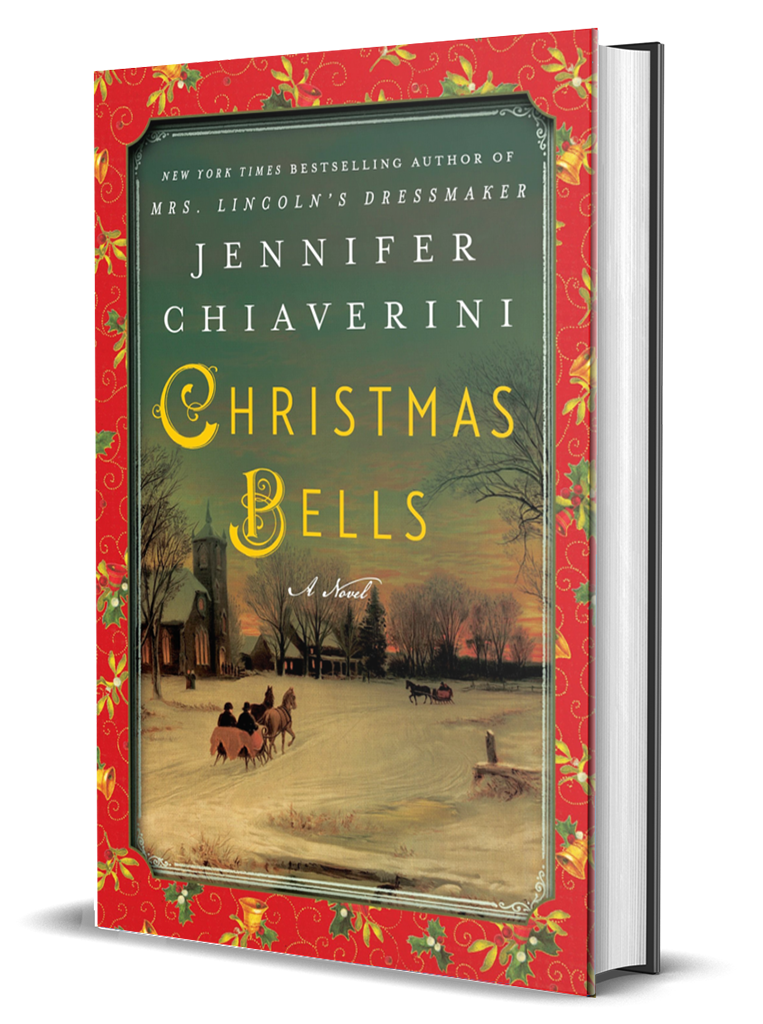
Christmas Bells
“Chiaverini stitches together a series of lightly interlocking contemporary vignettes in an intriguing way…A gentle exploration of tragedy, hope, the power of Christmas, and the possibility of miracles.” —Kirkus
New York Times bestselling author Jennifer Chiaverini celebrates Christmas, past and present, with a wondrous novel inspired by the classic poem “Christmas Bells,” by Henry Wadsworth Longfellow.
I heard the bells on Christmas Day/ Their old familiar carols play/ And wild and sweet/ The words repeat/Of peace on earth, good-will to men!
In 1860, the Henry Wadsworth Longfellow family celebrated Christmas at Craigie House, their home in Cambridge, Massachusetts. The publication of Longfellow’s classic Revolutionary War poem, “Paul Revere’s Ride,” was less than a month hence, and the country’s grave political unrest weighed heavily on his mind. Yet with his beloved wife, Fanny, and their five adored children at his side, the delights of the season prevailed.
In present-day Boston, a dedicated teacher in the Watertown public school system is stunned by somber holiday tidings. Sophia’s music program has been sacrificed to budget cuts, and she worries not only about her impending unemployment but also about the consequences to her underprivileged students. At the church where she volunteers as music director, Sophia tries to forget her cares as she leads the children’s choir in rehearsal for a Christmas Eve concert. Inspired to honor a local artist, Sophia has chosen a carol set to a poem by Longfellow, moved by the glorious words he penned one Christmas Day long ago, even as he suffered great loss.
Christmas Bells chronicles the events of 1863, when the peace and contentment of Longfellow’s family circle was suddenly, tragically broken, cutting even deeper than the privations of wartime. Through the pain of profound loss and hardship, Longfellow’s patriotism never failed, nor did the power of his language. “Christmas Bells,” the poem he wrote that holiday, lives on, spoken as verse and sung as a hymn.
Jennifer Chiaverini’s resonant and heartfelt novel for the season reminds us why we must continue to hear glad tidings, even as we are tested by strife. Reading Christmas Bells evokes the resplendent joy of a chorus of voices raised in reverent song.
Praise for Christmas Bells
Read an Excerpt from Christmas Bells
December 1860
On Christmas morning, bells pealed gloriously overhead as the Longfellow family walked home from church, until all of Cambridge resounded in exultant euphony. Harness bells chimed in, light and cheerful, as horse-drawn sleighs glided swiftly down Brattle Street, their laughing passengers bundled warmly in blankets against the nip in the air. The sky was a flawless azure redolent of Iberian seas with nary a cloud, the sun shone with golden morning light, and a soft, downy blanket of snow covered the earth. Everywhere friends and neighbors called out greetings, and even strangers wished one another a Merry Christmas and courteously made room to pass on the sidewalks. With the promise of a Yule log burning on the hearth at home, a sumptuous feast to come, a good bottle of wine at the table, and friends gathered round to share it, Henry could almost believe that the tidings of that holy day could turn even the angriest hearts to reconciliation.
Yet even as the gospel reading told the story of the birth of the Prince of Peace, Henry had overheard murmurs in the pews, troubling reports from South Carolina. After the service, as the worshippers filed from the church, conversations quickly turned from the exchange of holiday greetings to the rising enmity between North and South. The slave states had been threatening to leave the Union for more than forty years, but ever since Abraham Lincoln had won the presidential election in early November, tensions had soared and calls for secession in the Southern press had become even more frenzied and furious. Equally troubling, foreboding letters from Henry’s closest friend, Charles Sumner, the senior senator from Massachusetts, told of rising animosity within both chambers of Congress. Henry trusted Sumner’s judgment, for purely as a matter of self-preservation, his friend had become a careful observer of the temper of the Senate. More than four years earlier, Sumner had been beaten nearly to death in the Senate chamber by Representative Preston Brooks of South Carolina, who had taken great offense to one of Sumner’s more vitriolic speeches condemning slavery. Sumner’s head trauma and psychic wounds had been so severe that he had not resumed his Senate duties for three years.
Through the post, Henry and Sumner debated the likelihood that South Carolina would make good on her threats and leave the Union. “What I am afraid of,” Henry confided to his friend, “is not that they will go, but that the North will yield. The tone of the Boston papers—the Atlas only excepted—is very weak and spiritless.”
In conversations with his wife—his dear, beloved Fanny—Henry tried to be more optimistic. “Nothing will come of this bluster and outrage,” he had assured her only a few weeks before Christmas. “The Southern firebrands will settle down after Mr. Lincoln’s inauguration, just as they always have.”
“Do you really think so?” asked Fanny, her large, dark eyes full of worry and doubt. “Their anger seems different this time. The Southern aristocrats seem inflamed by a particular hatred for Mr. Lincoln, and a desperate fear that he’ll take away their slaves with a stroke of a pen on his first day in office.”
“If only it were that easy,” said Henry ruefully. “Fanny, you know how much I want slavery to be abolished, and soon, but even with Mr. Lincoln as president I think it’ll take time, and it’ll come only after the usual squabbling and deal-making in Washington City.”
“Then you don’t believe war is inevitable?”
“No, my dearest, I don’t, not war and not secession.” He smiled and kissed her. “I’ll believe that South Carolina truly intends to leave the Union when she leaves it and not before.”
Fanny had seemed reassured, and Henry too had allowed himself to hope, but then, only a few days before Christmas, at a state convention at St. Andrew’s Hall in Charleston, the delegates of South Carolina had voted unanimously to secede from the Union. The stock market roiled, politicians debated what to do, and citizens North and South wondered—some in trepidation, others eagerly—which states would follow South Carolina into rebellion.
With the Christmas bells ringing joyfully and his beloved Fanny on his arm, smiling warmly up at him from beneath the blue woolen hood of her cloak, it seemed to Henry almost unfathomable that anywhere thoughts could be troubled or hearts twisted in anger. He patted Fanny’s hand where it rested in the crook of his elbow and felt a familiar surge of wonder and happiness when she squeezed his arm tenderly and briefly rested her cheek against his shoulder. For all his poetical gifts, he could scarcely put into words what an inexpressible delight Fanny was to him, always and in all things. Although they had been married more than seventeen years, he still never caught a glimpse of her without a thrill of pleasure; she never entered a room where he was without his heart quickening, nor departed without feeling that some of the light went with her.
Henry and Fanny had first met more than twenty-four years before, not in Boston though they lived but five miles from each other, but while traveling in the Bernese Alps—Henry, alone and grieving the recent loss of his first wife in childbirth; Fanny on a European tour with her father, elder brother, sister, and cousin. At nineteen, Frances Appleton had known her own share of heartbreak, and knew more yet awaited her; her mother had died of consumption three years before, a brother a year later, and the same disease afflicted her dear cousin William, who was among the traveling party, seeking respite from his illness in the crisp mountain air.
Upon discovering that members of one of Boston’s most respected families were staying at his hotel in Thun, Henry had sent up his card to Fanny’s father, Nathan Appleton, a prominent member of the Whig Party and a prosperous businessman who had built a fortune developing New England’s textile industry. The Appletons were out at the time, but several days later, when they all had moved on to Interlaken, they finally met.
Drawn together by their sympathetic understanding of each other’s loss, Henry and Fanny became fast friends. For nearly three weeks, amid the sublime beauty of the snow-capped Swiss mountains rising above pure, crystal lakes, they passed many pleasant hours together, strolling, reading, discussing art and literature, boating, sketching, and translating German poetry. Henry enjoyed the company of the rest of her family too, especially her elder brother Thomas—witty, irrepressible, and artistic—and her cousin William, whose fragile health and undaunted spirits evoked Henry’s respect and sympathy.
All too soon duty summoned Henry elsewhere, but he parted from Fanny and her family in the consolation of knowing that they would meet again in Boston in a year’s time, after their grand tour concluded. Although Henry was by then an accomplished poet and a respected professor of modern European languages at Harvard, he realized that a significant disparity in social rank separated him from the Appletons. Yet he had been confident that the Appletons were too good, too noble-hearted a family, to let that impede their burgeoning friendship.
What he had not anticipated in the midst of mourning for his lost wife and unborn child was that, over time, his feelings for Fanny would grow beyond friendship. More than a year after they met, Henry declared his love for Fanny, only to be clearly and decisively told that she did not return it. Humbled, he withdrew for a time to recover from the sting of her rejection, but the Appletons remained fond of him, and eventually friendship won out over pride and he resumed calling at their gracious townhome at 39 Beacon Street. He tried to conceal his enduring admiration for Fanny, but failed badly enough that he regularly found himself the object of amiable teasing within Boston society.
Then, two years after Fanny spurned him, his infatuation and his pen conspired to ruin any chance for even friendship between them.
In August of 1839, his philosophical travel novel, Hyperion: A Romance, was published to perhaps more puzzlement than acclaim. The story told of a young American, Paul Flemming, who fell in love with an Englishwoman, Mary Ashburton, while both were traveling in Germany. Mary, whom Paul described to a fictional friend as “not beautiful, but very intellectual,” refused him as a suitor despite his many excellent qualities. Hyperion was widely read, with sales invigorated by American readers’ eagerness to learn about German culture, but within Boston society it provoked intrigue for entirely different reasons. No matter how often and how emphatically Henry protested that his book was a novel, a work of fiction, every mutual acquaintance insisted upon believing that Mary and Paul were thinly veiled renditions of a certain young heiress and a hapless, lovelorn professor. Within days of the novel’s publication, a chill—no, a veritable arctic whirlwind blowing down from the heights of Beacon Hill—descended upon their association.
This second, sterner, seemingly irrevocable rejection plunged Henry deep into melancholy. Writing offered him some solace, but teaching none, so he eventually requested a leave of absence from Harvard and traveled to Germany in hopes of recovering his health. After several weeks partaking of the regimen at Marienberg on the Rhine—morning sweats, four cold baths a day, vigorous walks, a simple, healthful diet—he felt restored enough to befriend some of the other patients and even to compose some poetry. Yet his longing for Fanny did not ease in proportion to his dawning resignation that she would never have him.
In the autumn of 1842 he returned to America, and soon thereafter he published several poems on slavery he had written during the tempestuous Atlantic crossing. He knew he risked damaging his professional reputation by expressing his abolitionist sentiments, not to mention jeopardizing friendships with acquaintances whose livelihoods in the textile industry depended upon Southern cotton—including the Appletons.
His radical position could not have offended Fanny too much, for she spoke to him kindly and cordially whenever they met in society. And then, months later and wholly unexpectedly, as they chatted at a party in the spring of 1843, Fanny mentioned that her brother would be leaving soon for Europe, and that she would want company in his absence.
Henry was not about to let even the wisp of a chance to renew their friendship elude him. Soon thereafter, he called on Fanny at home, and was received with such warmth that he dared write to her afterward and tell her that time and distance and discouragement had not altered his affections.
To his great joy, she replied that her feelings about him had changed utterly.
In July, seven years after they had found solace in their sympathetic companionship in Switzerland, and at least a year after Henry had abandoned all hope that Fanny would ever love him, they were wed before a joyful company of fifty friends and family in the parlor of the Appleton home. The bride, at thirty years of age, was radiant in a rich yet simple gown of muslin trimmed with splendid thread lace, the tunic gathered on either side of the skirt with orange blossoms, a delicate lace veil cascading from a wreath of orange blossoms upon her head to gently brush the floor. The groom, quietly rejoicing, kissed his bride tenderly and, after the celebration ended, he took her home to Craigie House beneath the soft light of a full moon, resolving never to be parted from her.
He had taken her home to rented rooms, but soon thereafter, Fanny’s father purchased the mansion for the newlyweds from the Widow Craigie, and at last Henry felt he had a home worthy of his most excellent wife.
As they approached the residence still known to all as Craigie House, he shook his head in affectionate exasperation as he watched their two sons hurry on ahead of the rest of the family. Flush with the freedom of their release from the solemnity of church, they grinned and teased and jostled each other, until Charley—still playful and impulsive at sixteen—accidentally knocked Ernest’s hat from his head and into the street, where a horse nearly trampled it—and Charley too, in snatching it out of the way.
“Do be careful, boys,” Fanny called out to them, alarmed.
“Sorry, Mother,” said Charley, and his younger brother quickly chimed in the same as he brushed snow from his cap and replaced it jauntily upon his thick brown locks.
“Charley’s recklessness will take years off my life,” Fanny murmured to Henry.
She had lowered her voice, but not enough. “Will it really, Mama?” asked ten-year-old Alice anxiously. She and her two younger sisters, arms linked and hands tucked into fur muffs, followed behind their parents with far greater decorum than their elder brothers preceded them.
“Of course not.” Smiling, Fanny turned to look reassuringly at solemn Alice and golden-haired Edith, all of seven years, and to kiss the rosy cheek of Allegra Anne, who at five was the baby of the family. “It’s just something people say.” As she straightened and turned, she caught Henry’s eye and, unseen by their daughters, cast her gaze to heaven with a look of such comic sufferance that he laughed.
The family arrived home without further incident or injury, and as soon as they crossed the threshold, the delicious smells of roast goose and plum pudding enveloped them. Charley and Ernest began conspiring to charm the cook into allowing them a taste before the feast was served, but Fanny overheard and promptly forbade it. “We have much to do before we can celebrate properly,” she reminded them, and assigned each a task or two that they hurried off to complete, the sooner to begin their fun. Henry too was given an assignment, and an easy, welcome task it was—to withdraw to his study and choose an appropriate Christmas story to read to the children later that evening. Fanny promised to summon him when their guests arrived.
A newly built fire crackled on the grate as he entered the familiar room, which smelled of woodsmoke and fine old books and furniture polish. Although he had written many of his most acclaimed poems there, either bent over the desk by the south window or seated in the chair by the fireplace writing in pencil to spare his tired eyes, the study was no dignified retreat where he toiled in isolation but rather a pleasant, welcoming nexus of domestic activity. Charley could burst in at any time of the day to play with his canary and chatter on about friends’ antics or dogs or sports or ships newly come to Boston Harbor. Ernest kept his crayons and paper and paints scattered upon a central oval table, and would often sketch scenes from memory or imagination while Henry wrote nearby, two artists companionably at work. The girls darted in and out, safe in knowing that their father would not rebuke them if they interrupted his train of thought with hugs and kisses and requests to mend broken toys or cut them new paper dolls. Quite to the contrary, he delighted in their innocent antics so much that he was inspired to compose a poem, “The Children’s Hour,” to capture forever the merriment of his daughters’ evening ritual of bursting into his office at twilight for hugs and good-night kisses.
He turned around in place, patting his pockets absently as if searching for something mislaid, until he remembered his errand. The newspapers stacked neatly on the desk he ignored, reluctant to allow reports of new threats from rebellious South Carolina to cast melancholy shadows upon the day. The most recent report he had heard, that the rebellious state’s newly appointed leaders had announced that the three federal forts within its borders no longer belonged to the United States but to their fledging separatist republic, surely diminished the likelihood that South Carolina would be swiftly restored to the Union through negotiation. At least Henry hoped such efforts were ongoing, and with increasing urgency; considering how President Buchanan had dithered and equivocated throughout the escalating crisis, Henry would not be surprised to hear that he was doing little more than staring at the calendar and counting the days until he could leave office and pass the problem on to Mr. Lincoln.
With an effort, Henry pushed thoughts of political matters aside and went to the nearest bookcase to scan the titles for a story that suited the holiday, something that would entertain the children and improve his mood. He had just taken Clement C. Moore’s book of poems from the shelf and was turning to “A Visit from St. Nicholas” when Anne Allegra—his dear little Annie—ran in, her brown curls bouncing, held back from her face by a ribbon of red velvet. “Mama says you’re wanted,” Annie announced, her sweet, piping voice ringing with authority.
“Then I’m duty bound to come,” he said, bowing as he tucked the book beneath his arm.
Beaming, Annie seized his hand and led him off to the foyer just as the brass knocker rapped twice to announce the arrival of their first guests.
Soon Craigie House was filled with friends and family, and the very walls seemed to resonate in harmony with their love and mirth and happiness. As the eldest, Charley led the boys’ games, merrily boisterous but full of fun and gentle with the younger lads. Alice and her favorite cousin quickly had the girls performing songs and reciting poems for an indulgent audience of parents and neighbors, warmed by the companionship of dear friends as much as by the Yule log blazing on the hearth. A Christmas tree stood in the corner of the drawing room, its evergreen boughs prettily adorned with candles, strings of popcorn, sugared fruits, and small trinkets wrapped in colored paper, gifts for their guests. A side table was laden with so many presents for the children—sent from loving aunts and uncles or left by affectionate friends who had called throughout the week—that it almost seemed to bow beneath the weight.
Then came time for the feast—roast goose, boiled ham, smoked fish, oysters, mince pies, potatoes with chestnuts, cranberries in jelly, and excellent Italian wines for the adults. No one wanted to talk about the secession fever sweeping from Charleston through the South, but as the wineglasses were refilled and the guests began feeling ever more merry and bright, the topic shifted from reminiscences of Christmases past to beloved Christmas stories from favorite authors. Before Henry could forestall it, a general clamor went up that he too should write a great Christmas tale, one to rival those of Clement Moore and Charles Dickens.
From the head of the table Henry caught Fanny’s eye, which sparkled with mischievous amusement; unnoticed by the others, she pressed her fingers to her lips to suppress laughter and raised her glass in a small toast to her husband. He was forever being told by well-meaning friends, admirers, and critics alike what he ought to write, and she knew how it vexed him.
As even the children chimed in with suggestions for the proposed Christmas tale, Henry threw Fanny a helpless look, pleading for intercession. Ever loyal, she rose to the occasion. “Don’t offer him too much inspiration,” she said, her voice carrying above the clamor, “or he’ll hurry off to his study to begin writing immediately, and we won’t see him again until the New Year.”
“We mustn’t allow that,” protested Henry’s good friend Louis Agassiz, a Swiss who had come to America in 1847 to join the Harvard faculty as a professor of zoology and geology. Since then he had become one of the most famous scientists in the world, and his startling theory that much of the Earth had once been covered in glaciers fascinated Henry. “It’s Christmas. This is not a day for labor, but for revelry.”
“And reverence,” added Frances Lowell, the wife of another close friend in attendance, the professor, editor, and poet James Russell Lowell.
“Yes, indeed,” declared Henry’s brother-in-law, Tom Appleton. “Let’s not forget that Henry must also continue to play host to us, his friends and relations. All told, I count three very good reasons he should not write today. Fanny,” he said, turning to his sister, “you must insist that he forbear composing any new verses until tomorrow.”
“I agree,” she replied, and to Henry, added, “Darling, I insist you postpone commencing this grand Christmas epic until January, at the earliest.”
“Very well, my dear.” Henry spread his hands and looked around the table, shaking his head and feigning regret. “I apologize, friends, but I must decline your most . . . interesting suggestion.”
Everyone gathered around the table, save the youngest children, burst out laughing, revealing that they had all been in on the joke.
As dessert was served—plum pudding, which had steamed enticingly upon the sideboard for what seemed like many fragrant and tempting hours, accompanied by a rich, velvety custard flavored with anise—Fanny said, “Henry will have another poem published very soon, which you may enjoy almost as much as a Christmas tale.”
Several friends nodded knowingly, for Henry had shown them drafts of the work in progress, but others turned inquiring looks upon their host. “Will it be another ‘Evangeline’ or ‘Hiawatha?’ ” asked Elizabeth Agassiz, Louis’s wife, an intellectual, well-spoken woman who had founded a school for girls in Boston. “Another stirring epic tale with an unlikely hero at its center?”
“I wouldn’t say unlikely,” said Henry. “I call the poem ‘Paul’s Revere’s Ride,’ and it will appear in the January edition of The Atlantic.”
“Who’s Paul Revere?” asked Alice, for children were not required to be seen and not heard within the Longfellow household—in fact, they were encouraged to question, to speak, to compose.
“He was a Boston silversmith and a patriot of the Revolution,” said Henry. “My grandfather, Peleg Wadsworth—your great-grandfather, children—was his commander in the Penobscot Expedition of seventeen seventy-nine. My poem, however, tells of the night Revere courageously risked his life and liberty to warn the colonials of an invasion by the British.”
“Sounds intriguing,” said Mrs. Agassiz. “I look forward to reading it.”
Henry inclined his head to thank her for the compliment. “I was inspired to write the poem after visiting the Old North Church last April. I climbed its tower, looked out upon the landscape, and contemplated the troubles our forefathers confronted in the early days of the republic and those we face now. I began writing the next day.” Then honesty compelled him to add, “I admit I took some liberties with historical fact—”
“As a poet must, for the sake of his art,” declared Tom, looking around the table for affirming nods.
“There were three riders, not one, for example,” said Henry, “and Revere’s role was to warn Samuel Adams and John Hancock that the Redcoats were marching upon Lexington to arrest them and seize their armories in Concord. I think—I trust—that my readers know the story well enough to understand that I altered facts for dramatic effect.”
“If they don’t, they should,” said Fanny stoutly.
“I only hope they see the whole poem,” Henry added, almost to himself. “Earlier this month, the Evening Transcript ran a version they said they took from The Atlantic’s advance sheets. Six lines were omitted—six rather essential lines.”
“Mr. Fields won’t make that mistake,” Fanny said soothingly. “The poem will be printed in its entirety, and the people will love it. Your Paul Revere is a hero for our own troubled times as well as the past.”
“Our generation too longs for a great man to save the nation,” said James Lowell, frowning slightly as he studied his wineglass. “Only instead of oppression from a foreign king, we confront secession. Instead of red-coated British regulars, we contend with Southern firebrands and slaveholders.”
“Perhaps Mr. Lincoln will be the hero for our times,” said Fanny. “Mr. Buchanan has availed us nothing, but if God wills it, his successor may yet heal the breach and preserve the Union.”
“Hear, hear,” said Tom, raising his glass.
They all joined in on a solemn toast that the New Year would bring reconciliation and peace, although Henry suspected not one of them, for all their vaunted intellect, could predict how that might come about.
When the feast was over, the older children pulled on their coats and mittens and raced outside to throw snowballs and tow sleds around the yard in the dwindling twilight while the adults settled in the drawing room to talk and reminisce, and to smile over the younger children as they played with the new toys Santa Claus had left in their stockings the night before.
They were warming themselves with hot coffee and amusing riddles when the children trooped back in, rosy-cheeked and exuberant. Once they were out of their wraps and comfortably settled by the fire with sugared plums and cups of hot tea, Henry read aloud “A Visit from St. Nicholas.” The younger children gazed up at him with rapt attention as the story of the jolly old elf’s visit unfolded, and from across the room, Fanny regarded him with such warmth and fondness, so much obvious enjoyment of the sound of his voice, that Henry could not imagine feeling any more blessed than he did at that moment on that holy day. The inevitable, trifling frustrations of daily life, the heavy responsibility of raising children, the onerous troubles facing the country—all fell away in the firelight. He marveled to realize that everything that truly mattered to him was represented in that gathering—family, friends, love, faith, hope. It seemed miraculous that one room could contain so much—but if a humble manger could hold the Divine, anything was possible.
The youngest children were dozing in their parents’ arms by the time the guests departed, the light of their lanterns and the music of sleigh bells fading as the horses carried them home and away. The Longfellow children were soon tucked into their beds with warm quilts and tender kisses. Shortly after midnight, their father and mother too retired for the night, tired but content.
“It was a very merry Christmas, wasn’t it, darling?” said Fanny as she plaited her hair into one long braid and tucked it beneath her cap.
“It was.” Henry yawned as she climbed into bed beside him, then he tucked the quilts around them both and kissed her. “One of the merriest in memory. May the New Year be as full of happiness and peace and friendship.”
“May it indeed,” Fanny replied drowsily, snuggling up close beside him.
Their hopes were short-lived, dashed by shocking developments in Charleston.
While the city slept on the night of December 26, Union Major Robert Anderson, acting without orders from his superiors, stealthily moved his troops from their vulnerable position at Fort Moultrie on the mainland to the incomplete but more strategically located Fort Sumter in Charleston Harbor. The next day, South Carolina militia seized Fort Moultrie and another federal stronghold, Castle Pinckney, and demanded that Major Anderson surrender.
Instead, Major Anderson and his men resolutely held their position, and the South Carolina militia settled in for the siege.


